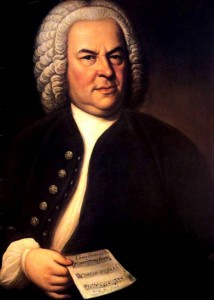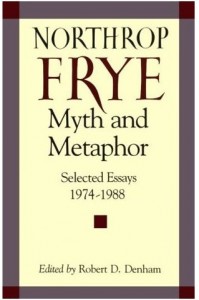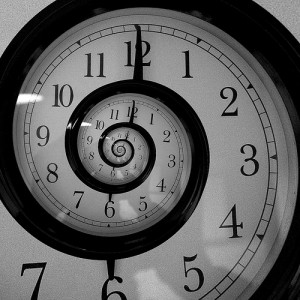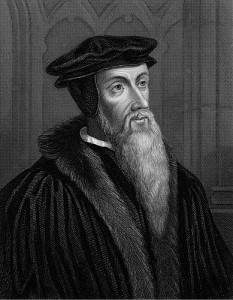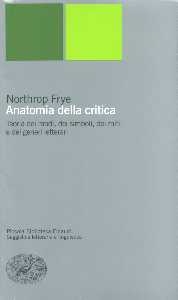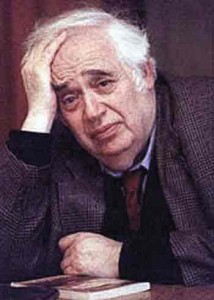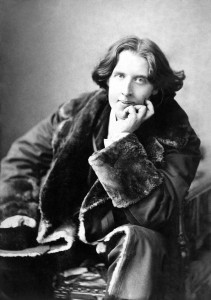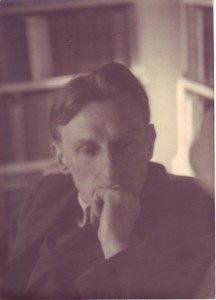
The first step in developing a genuine poetics is to recognize and get rid of meaningless criticism, or talking about literature in a way that cannot help to build up a systematic structure of knowledge. This includes all the sonorous nonsense that we so often find in critical generalities, reflective comments, ideological perorations, and other consequences of taking a large view of an unorganized subject. It includes all lists of the “best” novels or poems or writers, whether their particular virtue is exclusiveness or inclusiveness. It includes all casual, sentimental, and prejudiced value judgments, and all the literary chit-chat which makes the reputations of poets boom and crash in an imaginary stock exchange. (Anatomy of Criticism 18)
From Frye’s Notebooks (lifted from Northrop Frye Unbuttoned)
The Greatest Book Ever Written (at Oxford). I’m in Oxford now, & from my point of view the greatest book ever written at Oxford is the Anatomy of Melancholy. [RT, 132] (Abbreviations and links to texts below.)
The Greatest Book in the Bible. Genesis. [LN, 1:337]
The Greatest British Monarch. King Arthur. [LN, 2:598]
The Greatest Creative Mind of Modern Times. Shakespeare. [NRL, 108]
The Greatest Critic of His Time (potentially). If Hopkins could only have got rid of his silly moral anxieties, his perpetually calling Goethe a rascal and Whitman a scoundrel and the like, he’d have been the greatest critic of his time. [RN, 325]]
The Greatest Eros Poet (English). The greatest Eros poet in English is probably Marvell. [RT, 136]
The Greatest Eros Poets (Non-English). Dante & Plato are the world’s greatest Eros poets. [RT, 407]
The Greatest Example of Linearity. Christianity to the Bible was typically a linear, step by step response, the sacramental disciplinary habitus of which the greatest illustration is the interlocking march of Dante’s terza rima from one end of the chain of being to the other. [RT, 240]
The Greatest Fiction Writer of the Century (potentially). God, I wish D.H. Lawrence had some sense of real satire: if he had he’d have been by long odds the greatest fiction writer of the century. [LN, 1:322]
The Greatest Form of Prose. The Utopia. [LN, 1:404]
The Greatest Form-Shaper. Dante is an analogical visionary & stands opposite the Scripture, the “paradox” involved being that the greatest of form-shapers turns out to be the supreme analogist or reverser of the Word (Logos). [NAC, 4]
The Greatest Historical Novel. War and Peace. [LN, 1:407]
The Greatest Imaginations. Defeated nations have the greatest imaginations. [RT, 185]
The Greatest Impersonator in History. There are three kinds of geniuses: imposers, imposters, & impersonators, & I may be the greatest impersonator in history. [RN, 33]
The Greatest Literary Genius after Blake. The greatest literary genius this side of Blake is Edgar Allan Poe. [LN, 1: 165]
The Greatest Masterpiece of Experimental Prose in English Fiction. Tristram Shandy. [LS, 63]
The Greatest Moral Virtue. Jesus speaks of hypocrisy, which may be a vice in the gospel context but is one of the absolutely essential cementing force that holds society together. Morally, it is the greatest of all virtues. [LN, 1:270]
The Greatest Number of Demonic Images. The book with the greatest number of demonic images in it I ever read (the Inferno of course doesn’t count) was Melmoth the Wanderer. [TBN, 142]
The Greatest Occasional Writers. The occasional writing, of which the supreme example is the epistles of Paul, & the greatest English example probably Burke, needs more development. [RN, 77]
The Greatest Play of Shaw. Saint Joan. [LS, 180]
The Greatest Poet for Shakespeare. Ovid [TBN, 315]
The Greatest Protestant Poet of the Pathos. Bach [FMW, 166]
The Greatest Shakespearean Comedy. The Tempest. [LS, 158]
The Greatest Symposium Writer. Plato. [LN, 2:552]
The Greatest Thanatos Poem. The Iliad. [NR, 168]
The Greatest Titanic Spirit in Literature. Hamlet himself is the greatest example in literature of a titanic spirit thrashing around in the prison of what he is. [LN, 1:13]
The Greatest of Vices. Pride is the greatest of vices partly because it is the most futile of vices: man has nothing to be proud of. [LS, 87]
Abbreviations and links to primary texts after the break.
Continue reading →

